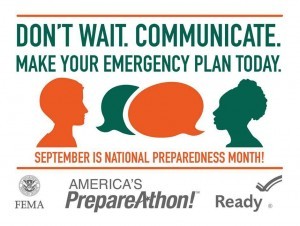Emergency preparedness can save your life and your loved ones! Are you prepared?
Be Informed
- WHAT EMERGENCY? Find out what kinds of disasters are most likely to occur in your area and how you will be notified.
- WATCH/LISTEN/CONNECT Watch TV, listen to the radio or check online often for updates or official instructions as they become available.
- STAY/EVACUATE Plan for both possibilities. In the event, use available information and common sense to determine if there is immediate danger and act accordingly.
Make a Plan
- NOT TOGETHER You may not be with your loved ones when disaster strikes. Plan how you will communicate with one another in different situations. Make contact cards that EVERY family member should have on them at all times, especially children.
- ESCAPE ROUTES Make drawings of two different escape routes for each room in your home. Practice them, especially with your children!
- SCHOOL/WORK Inquire at your children’s day care or school and at your workplace to make sure emergency plans are in place.
- FINANCES Download an Emergency Financial First Aid Kit at www.ready.gov/financial-preparedness
- PETS If you have pets, make sure to have an animal emergency supply kit. In case you have to evacuate, DO NOT LEAVE PETS BEHIND.
Build a Kit
- SURVIVE You may need to survive on your own after an emergency. Have food, water and other supplies to last 72 hours for each person in the family.
- SUPPLIES Food should be non-perishable, at least 1 gallon of water per person, batteries, radio, flash light, first aid kit, whistle, dust mask, baby wipes and garbage bags, plastic sheeting and duct tape, local maps.
- MEDICAL Make sure to have an extra 3 -5 day supply of medications for each family member.
For more detailed information, please go to ready.gov and please make sure emergency preparedness is part of your family!

